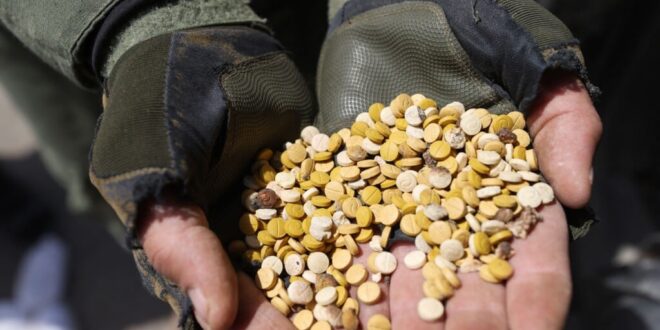Jordan reportedly launched airstrikes on December 18 targeting narcotrafficking operations in southern Syria hours after Jordanian forces foiled one of the largest cross-border smuggling operations to threaten the kingdom in years. Jordan’s border with Syria has grown increasingly volatile as the region remains preoccupied with war in the nearby Gaza Strip.
The strikes on Monday followed a series of bloody incursions at the Jordanian-Syrian border. On December 12, armed smugglers opened fire at a Jordanian border patrol, killing Jordanian Captain Iyad Nuaimi. The next day, Jordanian Foreign Minister Ayman Safadi told Iranian Foreign Minister Hossein Amir-Abdollahian on the sidelines of the Global Refugee Forum in Geneva that “those responsible” for Nuaimi’s death “will not escape punishment and will pay for their aggression and crime.”
Jordanian forces clashed with narcotraffickers again on December 14, killing one smuggler and intercepting 446,000 pills of the amphetamine-like drug captagon, along with other drugs, arms, and ammunition. On December 15, a shootout at the border with Jordanian guards left several smugglers wounded.
The largest clash occurred on December 18, when dozens of traffickers linked to Iran-backed militias attempted to infiltrate Jordan with rocket launchers, mines, and other explosives. Jordanian troops detained nine smugglers and seized nearly 5 million captagon pills. Echoing Safadi, the Jordanian military said in a statement that it will “continue to track these armed groups and prevent any attempt to undermine the kingdom’s security.”
Jordan proceeded to carry out multiple airstrikes inside Syria following this marked escalation. One strike reportedly hit the home of a prominent drug dealer in the town of Salkhad in Sweida province, near the Jordanian border. Other strikes targeted trafficking hideouts in neighboring Daraa province.
Jordan last took military action in Syria against the drug trade in August, hitting a drug factory near the Jordanian border. A strike in May killed narcotics kingpin Merhi al-Ramthan.
“Jordan knows the country that stands behind this,” former Jordanian Minister Samih Maayteh said on December 18. “It’s Iran sponsoring these militias. These are hostile military actions against Jordan on its territory.” Amman has for years blamed Iran-backed militias for the bloody drug war at its Syrian border. And with good reason.
As war rages in the Gaza Strip, Iranian militias have been quietly setting up narcotics factories inside Syria. Local media reported on December 9 that Iran’s Islamic Revolutionary Guard Corps (IRGC) helped establish a captagon factory in the city of al-Bukamal in eastern Syria. The facility is allegedly supervised by Hezbollah affiliates.
Syria’s thriving narcotics industry and the escalating narco-battles at the Jordanian border are a reminder that war in Gaza has not stopped Iran from stoking turmoil elsewhere in the region. The Islamist regime continues to reap financial and strategic gains from Hamas’s war.
 Eurasia Press & News
Eurasia Press & News




